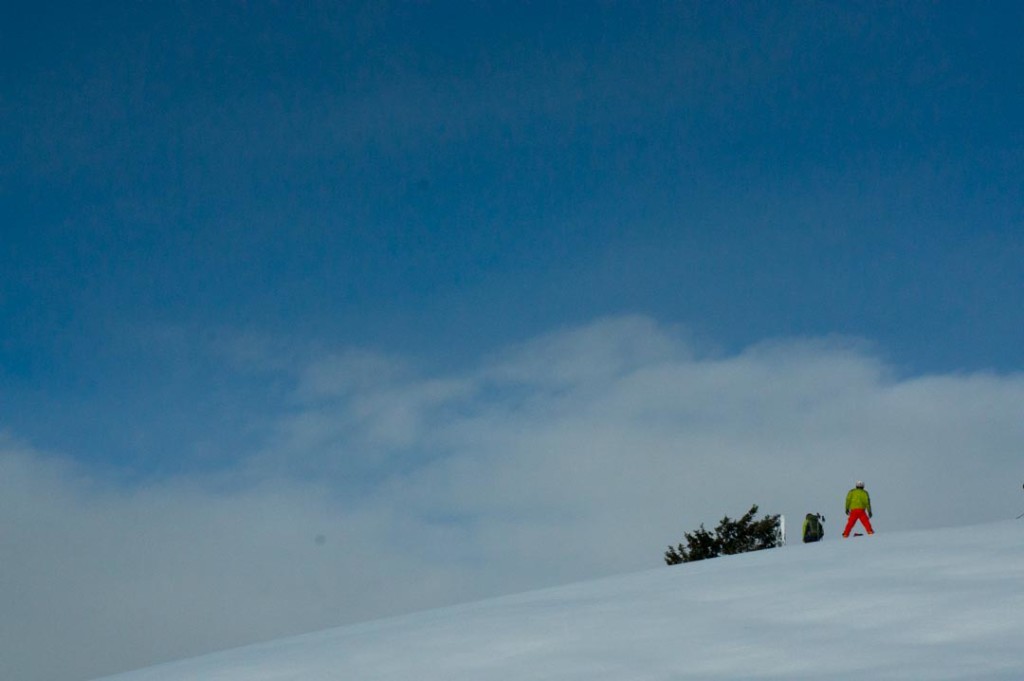It’s Tuesday. Your alarm goes off at 6:32 and you hit snooze three times. You get out of bed, start the coffee, and let the dog out. Your feet are cold on the kitchen floor.
Between the time the dog comes back in and the coffee is ready, you pull your phone from the charger and scroll through your routine: weather, avy report, Instagram, Facebook, email, in that order.
High of 51, 30% chance of rain. Snowline is 6,500 feet, looks like more of the same all week. Considerable danger, heavy new snow and wind on last week’s melt crust; looks like it needs some time. Next advisory on Thursday. Like a few photos. Leave an emoji comment.
You click the blue square and regret it immediately. You knew you would but you clicked it anyway. Wedding photo, engagement photo, album of baby photos, primary commentary. Scalia is trending. You get past the hot topics to the updates relegated below the fold, the detritus that for some reason you keep coming back to read.
Isn’t this why Twitter is dying? That people have figured out that they have better things to do than scroll through the streams of consciousness of idiots they’ve never met?
The coffee is ready. You pour a cup.
You flick through your newsfeed with your thumb, skimming the profile pictures and a few words at a time for something that might be interesting. It’s more of a tic now than anything, but one genre of post stands out.
“Help me raise awareness of Lou Gehrig’s disease by funding my half Ironman!”
Your blood boils. At least, if you’re anything like me, it makes your skin crawl.
The issue, of course, has nothing to do with fundraising for ALS research, in exactly the same way that your college roommate’s ex-girlfriend’s half Ironman has nothing to do with ALS. Fundraising for disease research is certainly a noble cause, apologizing for liking to be outside is not.
There’s a trend in sports and adventure to partner with philanthropic causes that doesn’t quite sit right with me. It’s as though we feel guilty for spending time doing something that we enjoy or vying for self improvement, and that dedicating our efforts to a charitable cause somehow veils the selfishness that comes with skiing across Antarctica, or pioneering new routes on Baffin Island, or finishing a first half marathon.
To me, partnering with a charity to justify or fund raise for what looks a lot like vacation is, at best, morally opaque, and at worst fraud.
Inherent in the trend of Racing for Charity, or Climbing for a Cure, is the implication that racing or climbing is not a worthwhile way to spend our time. A new ice route in Glacier Park or first descent in Chamonix calls for every ounce of passion and toil as a Grammy winning single. An expedition ski tour is as much an expression of creativity as a book of poems.
The implication is that adventure is somehow an idle pursuit, only as valuable as the attention that it brings to some more noble cause. But travel inspires. Each film, or trip report, or story over beers has the ability to light a spark in someone else and to get them to interact with the world in a new way.
Raising money for cancer research is a great thing to do. Here’s a link for a good place to do it. Events that exist primarily as fundraisers, like RATPOD, do a tremendous service as well. But let’s move away from the idea that we need to apologize for our passion with vapid associations with ineffective charities. The journey should be enough.
Balancing Reward
"It's really not as hard as people think," he said. Two ice cubes floated in amber liquid and clinked against the rim of the glass. He ... Read more
Tough Decisions
Al Allen, from what I recall, is not a tall man. By my junior year in high school his thinning black widow's peak stopped just above my ... Read more





Ben, You may be right for those of you who are young, strong and fit. But when I train all summer to do a 300 – 400 mile bike ride, it’s really not for fun — it’s to raise money for the charity (in the case of my ride, UCLA and Emory University for their AIDS Vaccine research). Yes, I enjoy seeing my friends on the ride who have done it in prior years, but it is NOT a vacation. At age 73, it is damned hard work, done for a cause. Yes, I enjoy the secondary benefit of being more fit, but that is clearly secondary.
Steve
Thanks for reading Steve! I agree with you 100%, and don’t necessarily mean that endurance events and fundraisers are mutually exclusive. RATPOD and the Firefighter Stairclimb Challenge are great examples of successful fundraisers that call for feats of fitness and training. I’m primarily pointing out a movement of athletes who do seem to be funding vacations by hitching them to ostensibly philanthropic banners. The underlying assumption that I think is damaging, is that athletic or adventurous pursuits are somehow less worthy of our time as other artistic past times. Hitching philanthropy to adventure for the sake of funding does a disservice to both pursuits.
What about when raising funds goes to something other than the expense of the trip? Say your expenses for the trip are $x and you raise double or even 10x that amount for a charity? Is that really so bad? Although I would hope the people doing this would pay for their own expenses so that all of the donations go to the charity.
I’d have a hard time saying that donating money to charity is somehow bad (although a growing body of research shows that a significant portion of humanitarian efforts of the last century have wavered between ineffective and detrimental). I do think that leveraging a charity to draw attention or goodwill to an unrelated adventure is exploitive of the charity and does a disservice to the inherent value of the trip itself.